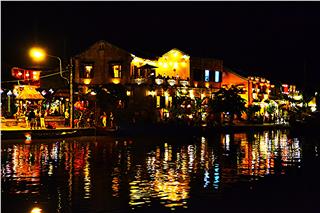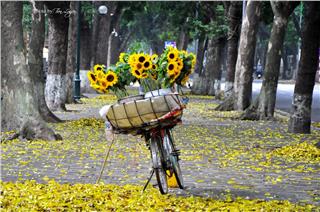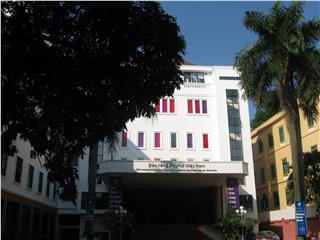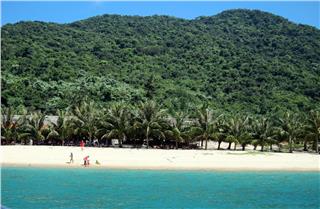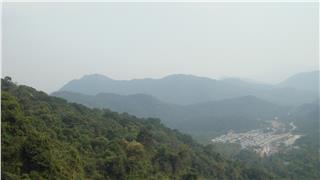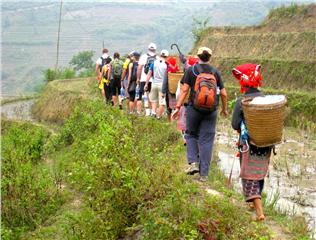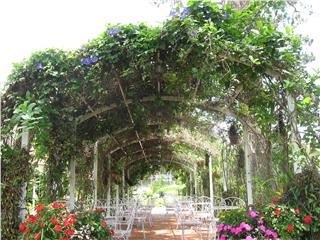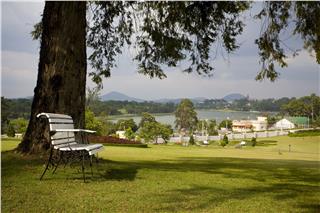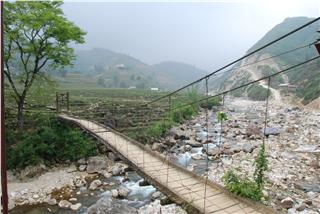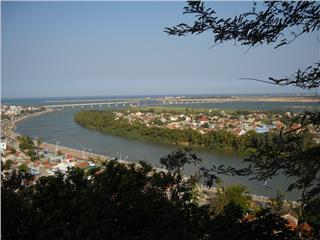Huong Tich Pagoda – Top scenic site of Hoan Chau
Thu, 02 Oct 2014 . Last updated Thu, 25 Jun 2015 08:52
-
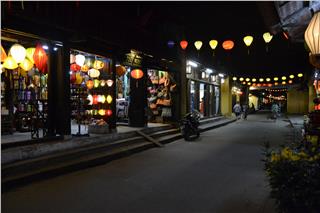 Hoi An travel to New Moon Festival 7231 viewed
Hoi An travel to New Moon Festival 7231 viewed -
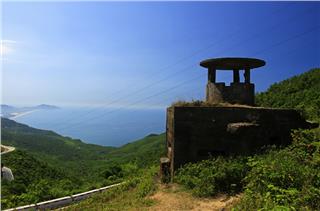 Vietnam War bunker near Da Nang 6705 viewed
Vietnam War bunker near Da Nang 6705 viewed -
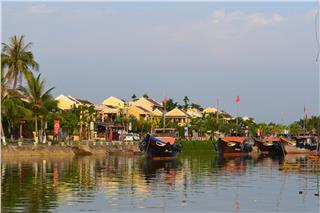 Ancientness of Hoi An ancient town 6618 viewed
Ancientness of Hoi An ancient town 6618 viewed -
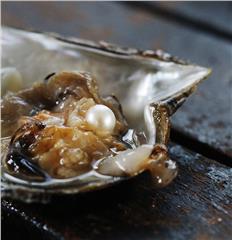 Discovering pearl in Phu Quoc Island 6123 viewed
Discovering pearl in Phu Quoc Island 6123 viewed -
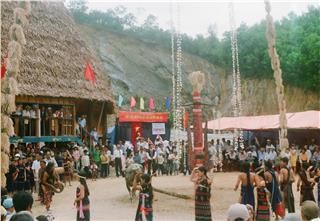 Discovering the Co Tu village in Quang Nam 5980 viewed
Discovering the Co Tu village in Quang Nam 5980 viewed -
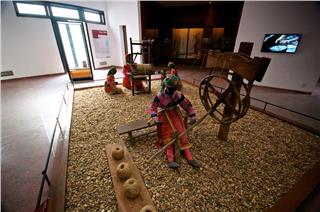 Cultural identity of ethnic groups in Vietnam Museum of Ethnology 5941 viewed
Cultural identity of ethnic groups in Vietnam Museum of Ethnology 5941 viewed -
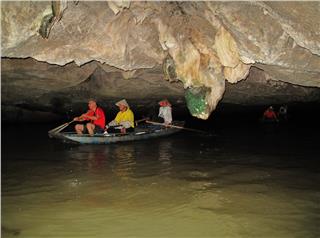 Visit Trang An complex in Ninh Binh 5844 viewed
Visit Trang An complex in Ninh Binh 5844 viewed -
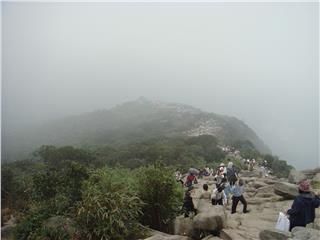 Yen Tu Pagoda and records of Vietnam 5813 viewed
Yen Tu Pagoda and records of Vietnam 5813 viewed -
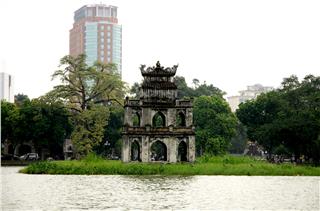 Hanoi Vietnam to Hoan Kiem Lake 5684 viewed
Hanoi Vietnam to Hoan Kiem Lake 5684 viewed
Hong Linh is a famous landscape in Ha Tinh. For long time, the mountain range with 99 peaks has been ranked as 1 of 21 scenic spots of Vietnam. In particular, Huong Tich Pagoda with many wonders has dubbed as "top scenic site of Hoan Chau".
Huong Tich Pagoda ranks top of Hong Linh Mountain
The scenic view of Ha Tinh looks very ancient
Going through all rains and shines,
Old Trang Vuong foundation still stands the wear and tear with time.
These verses by Dr. Thuong Trinh depict the beauty of an ancient pagoda situated on the top of Hong Linh Mountain (Thien Loc commune, Can Loc district, Ha Tinh).Legend has it that Hong Linh used to be called Ngan Hong with 99 phoenix-shaped mountains. The site, therefore, not only leaves its fame to history concerning its majestic beauty that is harmoniously mixed with the sky, mountain and water, but also has legends associated with ancient Linh Son Pagoda in the land of Ha Tinh.
Huong Tich Pagoda is the place where Dieu Thien, the youngest daughter of So Trang Vuong (King Zhuang of Chu), a King in Baiyue community is worshipped. As told in the legend, Dieu Thien, the princess fell in love with a court doctor named Trieu Chan. So she refused to marry an evil court army officer through arranged marriage by her father and left the court for a pagoda. The King got mad at her and ordered the pagoda burnt. Thanks to the help of nuns, Dieu Thien could escape from danger.
The Buddha told a white tiger to take her to Viet Thuong, a neighboring country. When she reached Hong Linh Mountain, she took a rest by Huong Tuyen stream and later went to Huong Tich cave to practice Buddhism. Soon after that, she became a popular for her benevolence. Trang Vuong King got serious sickness which could on be cured with an eye and a hand of a girl.
Neither of his two first daughters was willing to die to save their father. As the King heart about the kind-hearted nun in Viet Thuong, he sent a messenger to the neighboring country, begging for her eye and hand. Dieu Thien gave one of her eyes and her hands to the messengers. Thanks to her, Trang Vuong could recover. He ordered his men to build a pagoda for the nun to express his gratitude to her. But it was also the time when the King found out that his benefactor was his youngest daughter. He gave up the throne and got tonsured to become a monk.
The merit of Dieu Thien made the Buddha feel so moved. He granted her new eye and hand. After Dieu Thien died, she became Nam Hai Quan The Am Bo Tat, Goddess f Compassion. The place where she passed away is called Am Phat Ba (Goddess Temple). Coming here, you can see a statue of a White Tiger, the symbol of a deity in Huong Son. Only the So Trang Vuong foundation of the original pagoda remains today. As for court doctor Trieu Chan, he set off to look for Dieu Thien, when he knew that she became a nun.
He reached Hong Linh Mountain in Viet Thuong and lived in a cave. Every day, he wen t in search of medicinal herbs to save people. His cave is now called Am Duoc Su (Herbal Doctor’s Temple) and his grave moved to Huong Tich Pagoda. As time goes by, things have changed. However, legends about Huong Pagoda are still in the mind of locals.
The values of historical structures here remain intact today. Legend has it that there were 99 peaks around Huong Pagoda. However, as recorded in Hung King’s time, Hong Linh Mountain range has 199 peaks and the highest one is Thiu Linh, where Huong Tich Pagoda is situated. All pilgrims coming here can fell the compassion of the Goddess of Mercy and forget all worries in their daily life to remind themselves of the Buddha and do good things for the community.
There are two pagodas with the same name of Huong Tich in Vietnam. As written in “Huong Son Thien Tru Thien Pha”, Huong Pagoda (Huong Tich Pagoda in short) in Hanoi is actually only a replica of the one in Hong Linh Mountain. A Buddhist monk built Huong Pagoda in Hanoi under the reign of the Ly Hy Tong King whose era name was Chinh Hoa.
There are two pagodas named Huong Tich. According to the historical document published by the Association of Literature and Fine Arts, legends and family record books, the king, his wives and concubines went to Huong Pagoda festival on the 18th day of the second lunar month. This habit was maintained until the reign of Le Hy Tong King under the Le King-Trinh Lord dynasty. TrinhLord passed by Ha Son Binh one day and was amazed at its beautiful landscape. He thought that trust in the Buddha was the most important thing. Huong Tich Pagoda in Ngan Hong could be moved here to make it convenient for pilgrims. So, Buddhist monks and the King built the second Huong Pagoda in Ha Son Binh.
As the legend has it, under the King Le-Trinh Lord dynasty, most royal wives and concubines came from Hoan Chau region. So, they returned to their homeland by boat to attend Huong Pagoda festival in Hong Linh Mountain on the 18th day of the second lunar month. Trinh Lord decided to build a pagoda with the same name in Ha Son Binh (Hanoi today) to worship the Goddess of Mercy from afar. That’s why there are two pagodas named Huong Tich in Vietnam. Apart from these legends, Huong Tich Pagoda is believed to be built in the Tran Dynasty.
Recently, archeologists examined the patterns and structure of the pagoda and discovered many objects dated back to the Tang and Sui dynasties. Based on the result of their study, they concluded that Huong Tich Pagoda was built at the end of the Ly Dynasty and the beginning of the Tran Dynasty. Many vestiges carry the imprints of the Tran Dynasty. But to Director of Ha Tinh Museum Nguyen Tri Son, who has studied about the pagoda for years, the Temple of the Goddess of Mercy in the most sacred place with typical features of the architecture under the Tran Dynasty.
The back of the Temple of the Goddess of Mercy is a mountain. It’s the place where Dieu Thien, the third princess, is worshipped. We can find many inprints of the architecture under the Tran Dynasty here, say, the system of terracotta statues and also the statues of flying dragons and Lion’s club in prostrate position are still found. There’s a prayer to Buddha up there. The reason that the Temple of the Goddess of Mercy has image of holy animals is because she was a daughter of So Trang Vuong and she passed away, she became a Buddha. So her temple has features of both religion and ordinary life. Dragon patterns indicate the King and images of holy animals show the respect for deified people.
Huong Tich Pagoda was called the top scenic site of Hoan Chau. The religious complex comes in excellent harmony with the nature. Its worshipping hall, Three Treasures palace, ancestral house and varied religious structures, make it an impressive religious area amid a population of magnificent mountains. Stone was used to build the worshipping hall. The tranquility of an ancient pagoda remains unchanged today. The statues in the pagoda are arranged in the style of Mahayana. Here in the worshipping hall, people can express their wish to escape the cycle of reincarnation and practice morality principles of Buddhism.
Next to the worshipping hall is the Three Treasures Palace with artistic statues. The states aren’t too big to match the modest scale of the pagoda, but this place is the convergence of the past, the present and the future of Buddha with beautiful legends about life and ethics drawing humans closer to the world of honesty. Elaborate patterns and diversity of the states make the whole palace more sacred.
Huong Tich pagoda has a lot of statues. Apart from statues of Buddha, there are statues of real people, on the right and the left of the hall as said by Prof. Tran Lam Ben, Prof. Vu Quoc Hung. These statues have the features typical of sculpture of the 17th century. For example, this statue may be the one of a contributor to the pagoda or an official of that time. It’s a half-man, half-Buddha statue shown in different hat and the meditative posture. There are some other statues like this one. I think this statue is of great value because it proves that the pagoda is date back to the 17th century. As said in the legend, this pagoda was built in the Tran Dynasty.
The diversity in the statues of Huong Tich Pagoda is even supposed to be the result of combinations of pagodas. However, the important thing is that each statue contributes to the sanctity of an ancient pagoda amid the forest. Like other pagodas, Huong Tich Pagoda serves the religious demand of people. Moreover, the pagoda is situated on the highest mountain of the Hong Linh Mountain range – the symbol of Ha Tinh. Minh Mang King chose the image of this mountain range as a pattern on Anh Dinh, a tripod cauldron representing Ha Tinh 200 years ago. Huong Tich pagoda has a gorgeous beauty.
When people come here, their mind is at peace. Huong Tich Pagoda was built in the Tran Dynasty, but there are a lot of legends about its origin that depict filial piety. I think that filial piety and morality principles of Buddhism are closely attached to the pagoda. Visitors to the pagoda learn about children’s respect for parents and the way to do moral things and better their life. More and more people learn about Buddhism, the True, the Good and the Beauty in modern society. They go to the pagoda to pray for peace, wealth and admire the beauty of nature in the first month of spring to re-energize themselves. When they have freedom of mind, they can feel secured to work and faster their morality. The atmosphere of a pagoda can teach people about filial piety. So, the number of pagoda-goers is on the rise.
Huong Tich Pagoda festival takes place annually on the 18th day of the 2nd lunar month. The rugged path may be both precarious and challenging for pilgrims, but they brave it out to come here from every corner of the country. Everything happening here is imbued with the spiritual color. It reflects the culture of the region and shows people’s gratitude to the Goddess of Mercy. Legendary and historical, real and unreal, amid traces of the old days is a scared pagoda in the people’s heart.
Source: VTC10.com - NETVIET
- Tags:
- pagodas in Vietnam
- Huong Tich Pagoda
- Ha Tinh
- Temple of the Goddess of Mercy
- Huong Tich Pagoda festival

